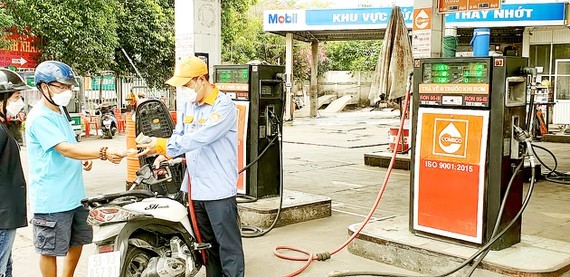 A gas station of Comeco Company in Phan Huy Ich Street in Go Vap District. (Photo: SGGP)
A gas station of Comeco Company in Phan Huy Ich Street in Go Vap District. (Photo: SGGP)
On February 19, after the Ministry of Industry and Trade announced the inspection of 33 petrol wholesalers, it was recorded that, at petrol stations in Ho Chi Minh City, the situation of selling petrol products in a limited quantity no longer happened. Specifically, gas stations, namely T.N. in Nguyen Van Troi Street in Phu Nhuan District, B.K. in Pham Van Chieu Street in Go Vap District, or B.T. in Nguyen Van Qua Street in District 12, have sold the right volume of gasoline that customers require.
According to current regulations, it is not mandatory for retail petrol stations to have how many gas pumps and how much gasoline to import each time, but in the business process, they are forced to import petrol products to meet consumer demand and stabilize the market.
According to the Market Surveillance Department of HCMC, inspections at some gas stations in the past few days show that RON95 gasoline was out of stock. However, gas stations then imported it, and business returned to normal.
As in the case of B.K Trading and Service Company, it stopped selling gasoline because its 8,000 liters of gasoline were sold out. In the next day, it imported another 8,000 liters of gasoline, and now opens for business normally; or the branch of B.K Trading and Service Company - Binh Chieu Petrol Station in Binh Chieu Ward of Thu Duc City - was out of stock. Later, it managed to import petrol products to open for business with all types of gasoline and oil products. However, the inspection delegation uncovered a shortage of RON 95 gasoline at some gas stations. However, these gas stations were still open and waiting to import gasoline to resume business.
Previously, Deputy Prime Minister Le Minh Khai asked the Ministry of Industry and Trade to lead and coordinate with the Ministry of Finance and relevant agencies to proactively manage petrol prices to ensure compliance with regulations on petrol trading, ensuring the supply of petroleum products for the domestic market, according to its competence.
The Deputy Prime Minister requested the Ministry of Industry and Trade to carefully assess the impacts on socio-economic development and people's lives; take full responsibility for the results of petrol price management; inspect and strictly handle violations, not to let profiteering, speculation, and illegal acts happen. The Deputy Prime Minister also asked the Ministry of Industry and Trade to actively do well the work of information and communication about the management of gasoline prices so that people and businesses know, creating consensus in society.
According to current regulations, it is not mandatory for retail petrol stations to have how many gas pumps and how much gasoline to import each time, but in the business process, they are forced to import petrol products to meet consumer demand and stabilize the market.
According to the Market Surveillance Department of HCMC, inspections at some gas stations in the past few days show that RON95 gasoline was out of stock. However, gas stations then imported it, and business returned to normal.
As in the case of B.K Trading and Service Company, it stopped selling gasoline because its 8,000 liters of gasoline were sold out. In the next day, it imported another 8,000 liters of gasoline, and now opens for business normally; or the branch of B.K Trading and Service Company - Binh Chieu Petrol Station in Binh Chieu Ward of Thu Duc City - was out of stock. Later, it managed to import petrol products to open for business with all types of gasoline and oil products. However, the inspection delegation uncovered a shortage of RON 95 gasoline at some gas stations. However, these gas stations were still open and waiting to import gasoline to resume business.
Previously, Deputy Prime Minister Le Minh Khai asked the Ministry of Industry and Trade to lead and coordinate with the Ministry of Finance and relevant agencies to proactively manage petrol prices to ensure compliance with regulations on petrol trading, ensuring the supply of petroleum products for the domestic market, according to its competence.
The Deputy Prime Minister requested the Ministry of Industry and Trade to carefully assess the impacts on socio-economic development and people's lives; take full responsibility for the results of petrol price management; inspect and strictly handle violations, not to let profiteering, speculation, and illegal acts happen. The Deputy Prime Minister also asked the Ministry of Industry and Trade to actively do well the work of information and communication about the management of gasoline prices so that people and businesses know, creating consensus in society.
























